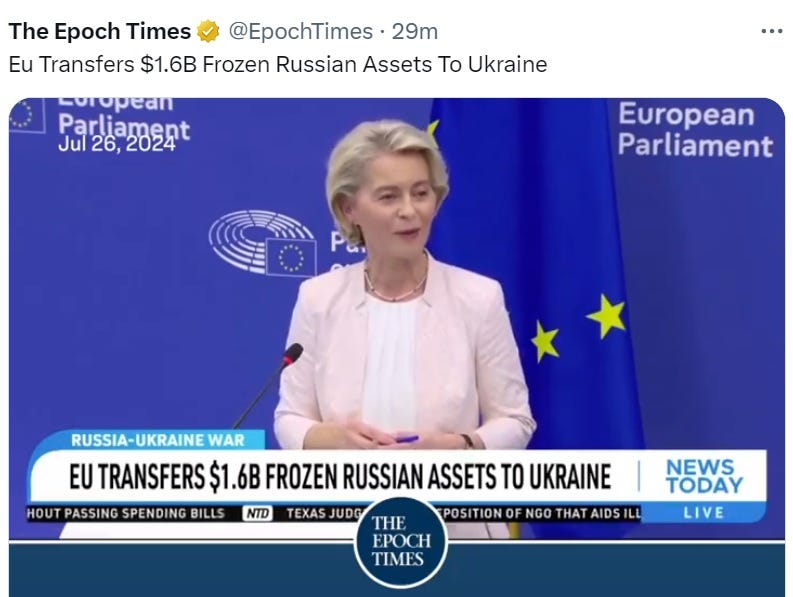July 29, 2024 | De-Dollarization Update: October Surprise?

The next BRICS meeting is scheduled for October, in Russia. In the meantime, a lot is happening on the de-dollarization front. Some recent news:
NATO just took Russian assets and gave them to Ukraine:
Not surprisingly…
Russia says it’s working with a group of countries to build a platform that doesn’t need the dollar
(Business Insider) – On Monday, Russian Foreign Minister Sergey Lavrov said BRICS countries are developing a payments platform that will allow them to bypass the US dollar, per TASS, a state news agency.
The initiative came from a summit of the BRICS countries in Johannesburg last year where the group — which includes the key members of Brazil, Russia, India, China, and South Africa — called for more trade and lending in their national currencies.
The new BRICS payments system could come in the form of a digital-currency system that allows for central banks to deal with local currency transactions directly. Lavrov himself touted a digital-currency-based settlement system to local media in April.
Russia’s Foreign Exchange Trading is NOW ALMOST 100% in YUAN. Meanwhile the US Response is 100% Predictable.
(Silver Industry News) – Key Points:
Details of the Transition:
- Yuan’s share in Russia’s foreign exchange market reached 95% in June
- This is a dramatic increase from just 1% in early 2022
- The dollar’s share has dropped to nearly zero, down from 80% in early 2022
Implications for Russia:
- Reduced vulnerability to Western financial pressures
- Increased economic ties with China
- Potential challenges in international trade and finance
Global Impact:
- Weakening of the dollar’s dominance in global markets
- Strengthening of the yuan as an international currency
- Potential shift in global economic power dynamics
BRICS+ is driving the new gold rush, China-Russia gold-backed currency would mark ‘beginning of the end’ of fiat – Swissgrams’ Vahan Roth
(Kitco News) – Central banks in BRICS+ and neutral countries are purchasing gold at an unprecedented rate, while political instability, inflation, and U.S. dollar weaponization are also bolstering gold’s appeal, according to Vahan Roth, executive director of gold tokenization firm Swissgrams AG.
In an analysis for intelligence consultancy GIS published Wednesday, Roth noted that gold’s surge to a new all-time high of $2,480 per ounce on July 17 underscores strategic moves by central banks in BRICS+ and other countries against a backdrop of geopolitical and economic uncertainty.
Roth said the runup in price is not surprising given the ongoing geopolitical turbulence. “There are two active wars – in Ukraine and the Middle East – and either (or both) could escalate at any moment into a wider international conflict,” he said. “Meanwhile, immensely influential elections are taking place this year: in India, the United Kingdom and the European Union incumbents lost clout, Mexico has a new leader with the same leftist program, and the unpredictable November presidential election in the United States is drawing closer.”
“Sociopolitical tensions, deep ideological divisions and dangerous polarization are becoming the norm worldwide.”
“A scenario of complete dedollarization could lead to a tectonic shift in the global geopolitical order,” he said. “In the extreme situation of the U.S. dollar being rendered effectively irrelevant, superpowers-in-waiting – Russia and China – could pose an existential threat to the current U.S.-dominated power structure. However, this appears unrealistic in the foreseeable future.”
Canadian Gold Exports to China Surge in Another Sign of Gold Flowing from West to East
(Money Metals) – Canada’s growing gold exports to China provide more evidence of the shift of gold from the West to the East.
Asian gold demand has been hot through the first half of 2024. Vietnamese and Thai investors flocked to gold despite long lines and high prices. Gold is flying off convenience store shelves in Korea. And gold demand in India recently surged during an important festival.
But China has been the biggest driver in Eastern gold demand.
As the Chinese central bank bought gold and dumped U.S. Treasuries, young Chinese investors lined up at shops to purchase gold beans.
Franco-Nevada Corp. Chairman Emeritus Pierre Lassonde recently said the world needs to wake up to this fact.
“The marginal buyer of gold is no longer the U.S. It’s no longer Europe. It’s China. … China takes up over two-thirds of all the annual production…That’s where the gold price is set.”
MBridge and the Petroyuan: A New Era of De-dollarization
(Financial Sense) – Richard Turrin, the best-selling author of Cashless, breaks down the recent move by Saudi Arabia to join the Chinese-led mBridge alternative to SWIFT, and how this will very likely lead to other countries diversifying away from US dollar for international payments and trade. Rich discusses the geopolitical and technological developments leading up to the mBridge system, how it works, and where it fits into China’s broader efforts in facilitating a BRICS-led alternative trading bloc.
Understanding De-dollarization
De-dollarization refers to the gradual reduction in the dominance of the U.S. dollar in global payments and trade. According to Turrin, this process is not a radical shift but a slow and steady change. The International Monetary Fund (IMF) has documented a decrease in the dollar’s share of foreign exchange reserves from about 72% to around 60% between 2000 and 2022, noted Turrin. This decline signifies a gradual move away from the dollar, although it remains a dominant global currency.
Turrin highlights that discussions around de-dollarization often evolve along two competing narratives: 1) the dollar is still king and there is no replacement or 2) the US dollar is in imminent danger of losing its reserve status. These two polarized views, he said, are both incorrect and, instead, investors must understand that de-dollarization is happening and will continue to unfold in a slow and gradual process in the years to come. There are many reasons for this, including geopolitical and technological factors.
Project mBridge (standing for multiple CBDC bridge) is a new blockchain-based transfer system started in 2021 in collaboration with the Bank for International Settlements and several other central banks, including those of China, Hong Kong, Thailand, and the United Arab Emirates. As of the most recent update, Project mBridge now has more than 26 members and aims to create seamless cross-border transfers using CBDCs–bypassing SWIFT–while reducing transaction costs and times.
The Emergence of the Petroyuan
A significant development that just took place as of June 2024 is Saudi Arabia’s recent decision to join the mBridge project, signaling the potential rise of a so-called petroyuan. China, now Saudi Arabia’s largest oil customer, is exploring the use of its digital yuan for oil transactions. This move could eventually lead to oil being traded in yuan instead of dollars, marking a significant shift in global trade practices.
Turrin points out that this is not just theoretical. In Shanghai, a major oil transaction worth $90 million was recently conducted using the digital yuan. This event underscores the practical feasibility of using China’s digital currency in international trade and hints at a future where the yuan could play a more prominent role in global markets.
Thailand eyes BRICS membership at October summit, begins OECD application
(Reuters) – Thailand hopes to become a member of the BRICS group of emerging economies at the organisation’s next summit in Russia in October, a foreign ministry official said Thursday.
The Southeast Asian nation submitted a formal request to join at a BRICS ministerial meeting a week ago, foreign ministry spokesperson Nikorndej Balankura said.
“We hope to receive positive feedback and be accepted as BRICS member as soon as the next summit to be held in Russia,” he said.
The BRICS group originally consisted of Brazil, Russia, India, China and South Africa. The acronym is derived from those countries’ names.
Last year the group began expanding membership, looking to challenge a Western-dominated world order, with Saudi Arabia, Iran, Ethiopia, Egypt, Argentina and the United Arab Emirates joining and more than 40 countries expressing interest.
October Surprise?
The consensus is that de-dollarization is a gradual process likey to play out over decades rather than months or years. But that opinion was formed before the US and its allies started flat-out confiscating Russian assets. This is highly motivating for BRICS countries who worry that they’re next. So maybe a big announcement at October’s meeting shouldn’t come as a surprise.
STAY INFORMED! Receive our Weekly Recap of thought provoking articles, podcasts, and radio delivered to your inbox for FREE! Sign up here for the HoweStreet.com Weekly Recap.
John Rubino July 29th, 2024
Posted In: John Rubino Substack
Next: “Well Hello Mr. Coyote” »












